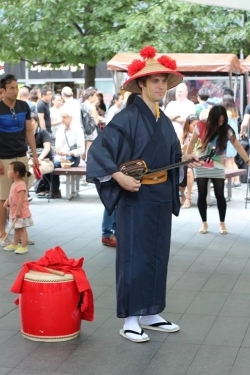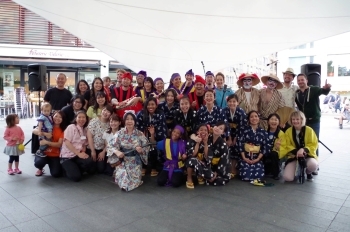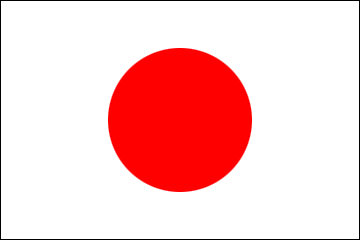Spotlight on: Okinawa Day 2018
2018/5/8
This month we turn the spotlight on Okinawa Day - an annual event in London, now in its 10th year, which celebrates Okinawan culture through food, music, martial arts and much more. The event is organised by the London Okinawa Sankshinkai. We spoke to the current group leader, Mark Griffiths, to find out more about the group and this year's Okinawa Day festivities.
 What are the activities of the London Okinawa Sanshinkai?
What are the activities of the London Okinawa Sanshinkai?
We practice and perform Okinawan music and dance. Primarily we use the Sanshin (a three-stringed lute) accompanied with singing. We also practice Eisa, which consists of a group of people drumming (taiko) and dancing (teodori) to a suite of songs performed by another group of people (jikata) playing the sanshin and singing. Most of the songs are sung in the Okinawan language, which is quite distinct from standard Japanese.
How did you come to be involved with the group?
I started playing sanshin while on the JET programme (2006-9) in Kumamoto (there happened to be a sanshin ’circle’ there). About a year after coming back to the UK, I found out about the London Okinawa Sanshinkai and Okinawa Day through listening to a radio interview with two members of the group. I went to Okinawa Day 2011 and have since spent an inordinate amount of time on Sanshinkai related matters. I feel incredibly lucky to have had the opportunity to be part of this wonderful group, thanks really to the founder members in particular, such as David Hughes and Matt Gillan.
What advice would you give to beginners who are interested in joining the group?
Come along to practice, come along to Okinawa Day and listen to lots of Okinawan music (there are plenty of videos on Youtube). Some people join because they are interested in Eisa dancing, others in playing sanshin and singing. The simplicity of playing the sanshin makes it a great instrument to get started with, and many people have joined the group who have never played any instrument before. At Okinawa Day this year people will be able to buy a sanshin so it’s the perfect time to get started!
Compared to mainland Japanese culture, what is it about Okinawan culture that attracts people?
Beautiful tropical islands, amazing music, inspiring performances and martial arts, incredible food, wonderful people, interesting language… there are a lot of reasons people fall in love with Okinawa and its culture. As the question indicates, Okinawa really does have a distinct culture from mainland Japan, but it is hard for me to make a comparison with mainland Japanese culture. We have members from many different places, including Okinawa, mainland Japan, the UK and all over the world who have fallen in love with Okinawa for one reason or another. I think people have different routes into Okinawan culture, and where people start is often not where they end up. For me it was through listening to music. I was first attracted by a few songs I heard by the group Begin, without really knowing all that much about the culture.
This year marks the 10th Okinawa Day in London. Can you tell us about how the festival was founded?
 Okinawa Day started through the activities of the London Okinawa Sanshinkai. The first Okinawa Day was very different to its current form, it was a much smaller affair, held at Cafe Oto in London. The event grew the following year in 2010 through our partnership with Spitalfields Market. Regarding the timing, the 23rd of June is Irei no hi, the date to commemorate the final day of the battle of Okinawa in WWII and to promote peace. Alongside many events in Okinawa, this date was chosen for Okinawa Day and I think this gives our event extra meaning, and hopefully we can help promote a message of peace.
Okinawa Day started through the activities of the London Okinawa Sanshinkai. The first Okinawa Day was very different to its current form, it was a much smaller affair, held at Cafe Oto in London. The event grew the following year in 2010 through our partnership with Spitalfields Market. Regarding the timing, the 23rd of June is Irei no hi, the date to commemorate the final day of the battle of Okinawa in WWII and to promote peace. Alongside many events in Okinawa, this date was chosen for Okinawa Day and I think this gives our event extra meaning, and hopefully we can help promote a message of peace.
What can people expect to find at this year’s Okinawa Day?
We have decided to go big this year. We will have professional performers from Okinawa and performances from a Miyako Island folk music teacher who will also be selling sanshins he has made with his very own hands. Of course these things are in addition to what already makes Okinawa Day so popular, such as plenty of live music, Eisa, karate, tea ceremony, and stalls selling a range of delights including plenty of Okinawan food and drinks.
What are the future plans of the London Okinawa Sanshinkai?
Certainly the focus for our year is Okinawa Day (planning it takes the best part of a year!) and if we can continue to develop Okinawa Day so that we can help others enjoy Okinawan culture that is something very important to us. It will be an extra special Okinawa Day this year, and I hope that we can continue to maintain that level in coming years. We are extremely lucky to have the ongoing support of many organisations, such as SOAS (The School of Oriental and African Studies), Spitalfields, the Great Britain Sasakawa Foundation, Japan Green Medical Centre and Sakai Moving Service. With this support I think we can continue to grow and share the culture of these incredible islands with more and more people.
 What are the activities of the London Okinawa Sanshinkai?
What are the activities of the London Okinawa Sanshinkai?We practice and perform Okinawan music and dance. Primarily we use the Sanshin (a three-stringed lute) accompanied with singing. We also practice Eisa, which consists of a group of people drumming (taiko) and dancing (teodori) to a suite of songs performed by another group of people (jikata) playing the sanshin and singing. Most of the songs are sung in the Okinawan language, which is quite distinct from standard Japanese.
How did you come to be involved with the group?
I started playing sanshin while on the JET programme (2006-9) in Kumamoto (there happened to be a sanshin ’circle’ there). About a year after coming back to the UK, I found out about the London Okinawa Sanshinkai and Okinawa Day through listening to a radio interview with two members of the group. I went to Okinawa Day 2011 and have since spent an inordinate amount of time on Sanshinkai related matters. I feel incredibly lucky to have had the opportunity to be part of this wonderful group, thanks really to the founder members in particular, such as David Hughes and Matt Gillan.
What advice would you give to beginners who are interested in joining the group?
Come along to practice, come along to Okinawa Day and listen to lots of Okinawan music (there are plenty of videos on Youtube). Some people join because they are interested in Eisa dancing, others in playing sanshin and singing. The simplicity of playing the sanshin makes it a great instrument to get started with, and many people have joined the group who have never played any instrument before. At Okinawa Day this year people will be able to buy a sanshin so it’s the perfect time to get started!
Compared to mainland Japanese culture, what is it about Okinawan culture that attracts people?
Beautiful tropical islands, amazing music, inspiring performances and martial arts, incredible food, wonderful people, interesting language… there are a lot of reasons people fall in love with Okinawa and its culture. As the question indicates, Okinawa really does have a distinct culture from mainland Japan, but it is hard for me to make a comparison with mainland Japanese culture. We have members from many different places, including Okinawa, mainland Japan, the UK and all over the world who have fallen in love with Okinawa for one reason or another. I think people have different routes into Okinawan culture, and where people start is often not where they end up. For me it was through listening to music. I was first attracted by a few songs I heard by the group Begin, without really knowing all that much about the culture.
This year marks the 10th Okinawa Day in London. Can you tell us about how the festival was founded?
 Okinawa Day started through the activities of the London Okinawa Sanshinkai. The first Okinawa Day was very different to its current form, it was a much smaller affair, held at Cafe Oto in London. The event grew the following year in 2010 through our partnership with Spitalfields Market. Regarding the timing, the 23rd of June is Irei no hi, the date to commemorate the final day of the battle of Okinawa in WWII and to promote peace. Alongside many events in Okinawa, this date was chosen for Okinawa Day and I think this gives our event extra meaning, and hopefully we can help promote a message of peace.
Okinawa Day started through the activities of the London Okinawa Sanshinkai. The first Okinawa Day was very different to its current form, it was a much smaller affair, held at Cafe Oto in London. The event grew the following year in 2010 through our partnership with Spitalfields Market. Regarding the timing, the 23rd of June is Irei no hi, the date to commemorate the final day of the battle of Okinawa in WWII and to promote peace. Alongside many events in Okinawa, this date was chosen for Okinawa Day and I think this gives our event extra meaning, and hopefully we can help promote a message of peace.What can people expect to find at this year’s Okinawa Day?
We have decided to go big this year. We will have professional performers from Okinawa and performances from a Miyako Island folk music teacher who will also be selling sanshins he has made with his very own hands. Of course these things are in addition to what already makes Okinawa Day so popular, such as plenty of live music, Eisa, karate, tea ceremony, and stalls selling a range of delights including plenty of Okinawan food and drinks.
What are the future plans of the London Okinawa Sanshinkai?
Certainly the focus for our year is Okinawa Day (planning it takes the best part of a year!) and if we can continue to develop Okinawa Day so that we can help others enjoy Okinawan culture that is something very important to us. It will be an extra special Okinawa Day this year, and I hope that we can continue to maintain that level in coming years. We are extremely lucky to have the ongoing support of many organisations, such as SOAS (The School of Oriental and African Studies), Spitalfields, the Great Britain Sasakawa Foundation, Japan Green Medical Centre and Sakai Moving Service. With this support I think we can continue to grow and share the culture of these incredible islands with more and more people.

